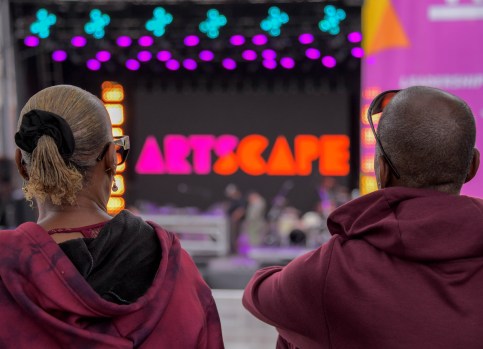Six weeks before Artscape returns, Mayor Brandon Scott’s office appears poised to allow the Baltimore Office of Promotion and the Arts to continue mounting city festivals and other public celebrations — at least for now.
A draft contract from city officials that represents a qualified expression of confidence in Baltimore’s arts council and that contains a new kill clause was approved at a Thursday night meeting by BOPA’s board of directors. Interim board chairman Andrew Chavez said the proposed contract would be for one year only; the previous contract signed in 2019, was for five years.
The draft contract contains a provision that would permit city officials to revoke BOPA’s status as Baltimore’s arts agency at any time — a decision that would effectively put the quasi-governmental agency out of business.
“This is not something that has ever been in the contract language before,” BOPA CEO Rachel Graham told the board. “Our job as an arts organization is to prove [to city officials] that shouldn’t happen, and to prepare the way forward for the artists and arts groups we serve just in case it does.”
The contract’s financial details were discussed in a closed session of the board. But last month BOPA went before the City Council’s Ways & Means Committee to defend its $2.73 million budget request, which was largely unchanged from this year. No formal objections were raised to the proposed budget during the May 24 hearing, nor were further hearings scheduled, as had been done in previous years.
The City Council approved Mayor Brandon Scott’s $4.2 billion budget for fiscal 2024-25 on Monday.
Chavez chalked up the new restrictions to a series of controversies that roiled BOPA in 2023, which included the forced resignation of former CEO Donna Drew Sawyer, a botched attempt to trademark the Artscape name, and widespread confusion over the return of Artscape, the city’s marquee public event, following a four-year, pandemic-induced hiatus.
Earlier this year, it appeared that tensions between BOPA and the city had begun to ease. Graham, who was appointed as BOPA’s CEO in February, has a close working relationship with Tonya Miller Hall, the mayor’s senior adviser of arts and culture. Then, in late March, Hall was appointed to BOPA’s 13-member interim board.
But as recently as last year, a faction of the City Council threatened to defund BOPA, and it seems that some of their original reservations remain.
Chavez said the limitations in the proposed contract are “a reflection of the city’s concerns with past administrations and board performance,” and added: “We’re taking steps that don’t encourage the city to act [on the termination clause.]”
Hall recused herself from Wednesday’s vote, Chavez said, to avoid the appearance of a conflict of interest, since she helped negotiate the proposed contract on the city’s behalf.
Realistically, it might have been difficult for the city not to offer BOPA a contract of some sort. To do otherwise would have risked derailing the 40th anniversary Artscape, which is scheduled to return Aug. 2-4. Often described as the nation’s largest free outdoor arts festival, Artscape at its peak attracted 350,000 visitors and generated revenues of $28.5 million.
The 39th festival, which was marred by horrible weather that caused the cancellation of Artscape’s busiest day, attracted just 44,000 festivalgoers who generated an estimated $12.1 million in economic activity for the city.
BOPA’s current contract expires June 30. The city’s Board of Estimates is expected to consider approving the one-year proposal at its June 26th meeting.



